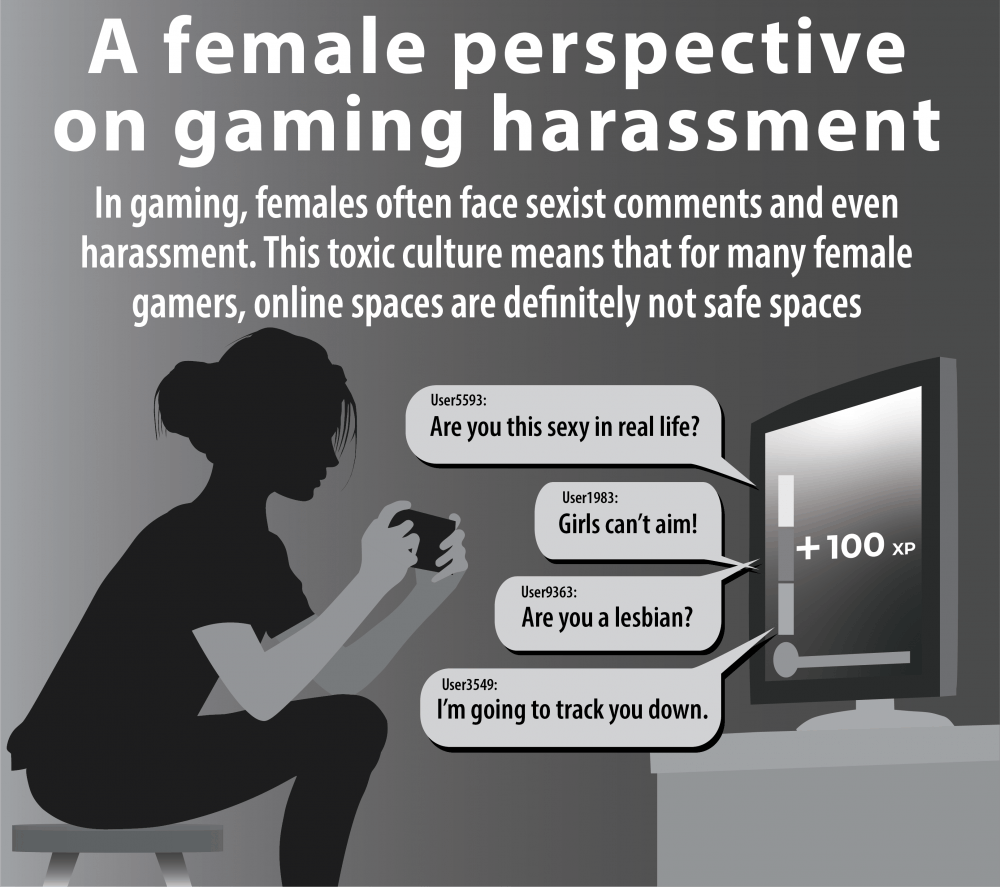"Overwatch" has several game modes, including team competitive play. This gameplay involves communicating with players over microphones to coordinate strategy and hopefully win. Qian said that as soon as other players merely hear her voice, the harassment begins.
If the outcome of the match isn’t favorable, the comments only get worse.
"They’ll blame it on you," Qian said. "You have to hide your stats because they will use everything against you and kind of gang up on you to try and get you banned.”
Competitive play involves teams of six, with each player filling a specific position on the team. Within the game there are gender normative roles. Qian said she is often relegated to the role of healer, supporting the team rather than playing on the front lines.
“They say, ‘Girls can’t aim, so if you pick the main attack role we’re probably going to lose,’” Qian said. “If they find out that it’s a girl playing they’ll say, ‘You should switch back to healer.’ Even if you’re winning.”
Qian originally played "Overwatch" on Xbox One before switching to a PC gaming platform. On Xbox, the comments about her gender and skill started even before she turned on her microphone — all because of her screen name, “izzylizzy99.”
Now when playing "Overwatch," Qian said she experiences this harassment every other game on average. But Qian’s worst harassment experience occurred after her team lost in a competitive game.
“This one guy was saying, ‘I’m going to track you down, and then rape you and your whole family, and then behead you,’” Qian said with an uneasy laughter.
Qian said these severe threats are rare. More commonly, male players will tell her their food orders, insinuating she should not be participating in the game, but rather preparing food for them.
There are options to report harassment in "Overwatch." Qian said the main feature is "avoid this player," but this increases her queue time — delaying her from joining and starting a game.
Fortnite
UNC senior Annabelle Webb has played "Fortnite" since her sophomore year. "Fortnite" is a popular shooter-survival game available on multiple platforms, such as mobile — Webb’s preferred gaming platform.
To get the day's news and headlines in your inbox each morning, sign up for our email newsletters.
When Webb plays "Fortnite," she said she opens the app, logs in and immediately mutes her microphone, which prevents users from verbally communicating with her in the game.
If another user begins to talk through the app's voice chat feature, Webb said she will turn her microphone on. She said usually the gamer on the other side is a young teenage boy who automatically assumes that Webb is male. Once the gamer hears her voice, they immediately question her gender and her sexuality.
“If they figure out that I’m a girl, they’ll ask, ‘Are you a girl?,’” Webb said. When she answers yes, the immediate follow up is — “Are you a lesbian?”
After assuming and questioning her gender and sexuality, they turn to another factor — her skill as a gamer. Webb said next they question how long she has been playing.
"Fortnite" is played in seasons that last about 10 weeks each. Webb has been playing since season three — currently "Fortnite" is in season 10. Despite her long history playing the game, there is an underlying assumption that because she is female, she is automatically less skilled.
“They said, ‘I started on season 7, but I know I’m better than you,’” Webb said.
Webb said these comments stem in part from the hyper-sexualization of women in video games in everything from their avatars to actual gamers seen in pop culture.
“It’s always that dichotomy, either you’re a guy and you’re really good, or you’re a girl and you suck, but you’re hot,” Webb said.
UNC senior Emma Stubblefield also said the hyper-sexualization of female characters in video games contribute to this harassment and sexism. She said female characters are often dressed in scantily clad armor, meant to be sexy and attractive.
“There is definitely a male gaze intended with a lot of these games,” Stubblefield said.
Webb said she has never reported the sexist comments. She said this gender-based assumption of lower skill level is nothing new, specifically relating her experience in gaming culture with her experience in robotics club.
“I was in robotics club in high school, and I dealt with a lot of the ‘You’re not good enough because you’re a woman’ feeling, so I’m kind of used to it,” Webb said. “But it’s weird when you hear it from people who a) don’t know who you are, and b) are half your age.”
Behind the screen
Qian and Webb said much of this harassment stems from the anonymous nature of gaming. Behind the computer screen, some feel there are no consequences to what they say.
“People are always keyboard warriors,” Webb said. “They feel more empowered to do things when they aren’t physically present.”
Stubblefield said direct communication over a microphone upholds this anonymity.
“Even if you can hear someone’s voice, you’re probably not going to run into this person in real life and have to deal with the repercussions in that way,” Stubblefield said. “It’s a lot easier to be mean and nasty to people.”
Because of this physical distance between gamers, Qian said she has never felt genuinely threatened, even after hearing violent comments. She said she has accepted this form of online harassment as normal.
“It’s a pretty commonly known thing among my friends that if you hop onto a game, you’re probably going to get harassed,” Qian said.
Overall, Webb said she thinks that gendered language and harassment needs to be addressed, but she said that it's difficult to address these behaviors because of how deeply rooted sexism is in gaming culture.
“It’s hard to have a discussion because video games are so new, but hyper-sexualization of women and sexism are so old,” Webb said.
@Madelinellis
arts@dailytarheel.com



